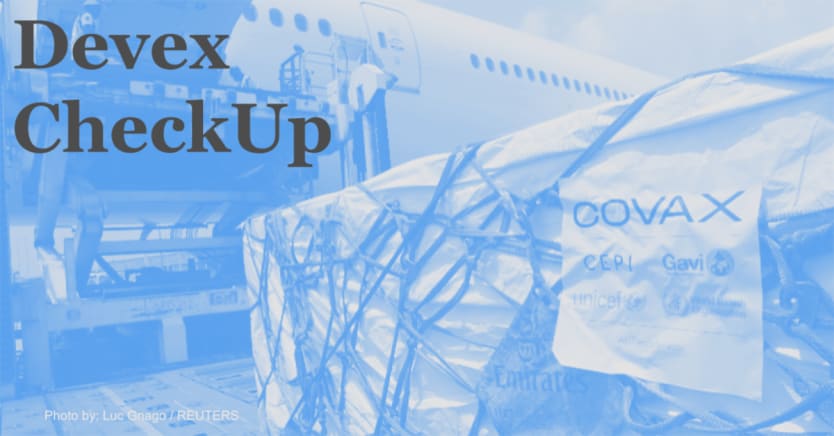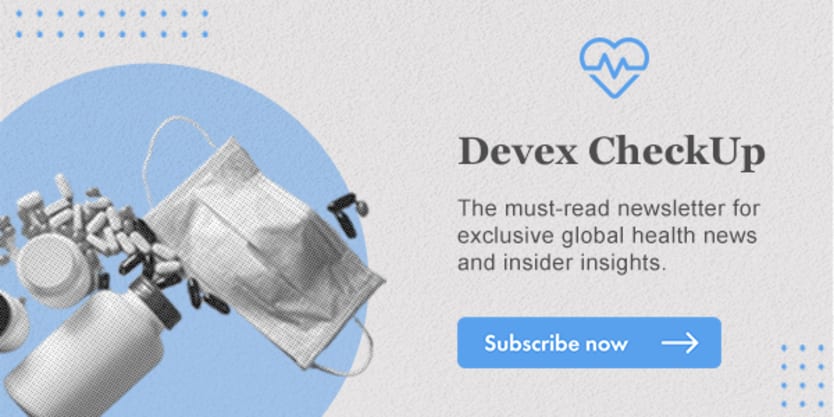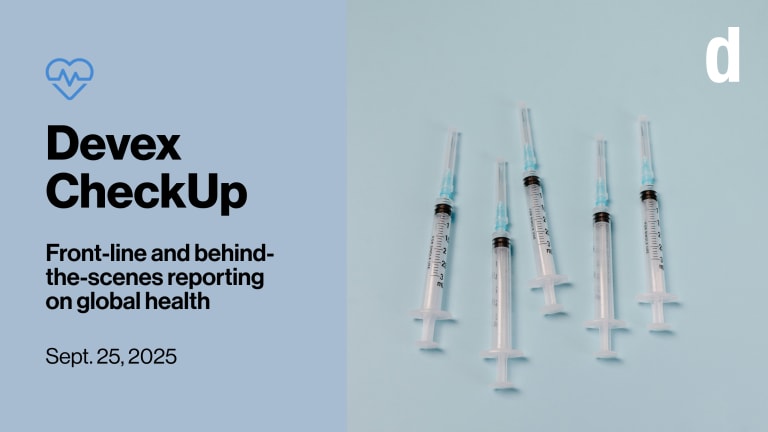Presented by Partnership for Quality Medical Donations

At Devex World, our flagship event in Washington this week, our colleagues asked global health leaders: How can we prevent — or, failing that, be better prepared to manage — the next pandemic? Here are their pitches:
Vaccines and partnerships: Broad investments in vaccine research and development must happen before the next threat emerges, according to Richard Hatchett, the CEO at the Coalition for Epidemic Preparedness Innovations. “We are not prepared for many of the other viral families that represent threats, and we have to have a global [research and development] concerted investment to make sure that our preparedness for future threats is broad,” he said. Partnerships also must be forged now, “You don't want to be exchanging business cards at the site of a disaster,” he said.
This is a preview of Devex CheckUp
Sign up to this newsletter for exclusive global health news and insider insights, in your inbox every Thursday.
Equity and financing: Jumana Qamruddin, a health specialist at the World Bank Group, said equity should be at the heart of pandemic preparedness. “Equity has to be central. It can't be a nice-to-have,” she said. Qamruddin also supported the idea of financing strong regional institutions, which “creates an ecosystem in which you can have deeper engagement at a more ... distributed level." She also advocated for more risk-taking by financial institutions.
Manufacturing and research: Amadou Sall, director at the Institut Pasteur de Dakar, said there needs to be an uptick in R&D on the African continent to ensure a pipeline of homegrown vaccines are available — from the development phase to manufacturing. Innovation is also key so the continent can leapfrog over lessons that had to be learned elsewhere. “The future in Africa can't be the past of other nations,” he said.
Read: Experts urge laying a collaborative pandemic prevention foundation now
ICYMI: Gates pushes for more innovation, funding to fight next pandemic
Deliberate disruption
Amid a process to grant more independence to the Africa Centres for Disease Control and Prevention, Devex recently reported on advocacy by WHO’s Regional Office for Africa to limit its autonomy. According to a document obtained by Devex, WHO objects to giving Africa CDC the authority to declare and coordinate regional health emergencies for the continent, as this overlaps with the World Health Organization’s role.
When asked about this at Devex World, Dr. John Nkengasong, the former director of Africa CDC, said it’s time to give more power to regional and local authorities while still maintaining a unique role for global institutions. Much has changed since WHO was set up some 70 years ago, and we should listen to regions that are seeking more ownership of their health security, he said.
Nkengasong, who now heads PEPFAR, argued that the regional ability to declare health emergencies — and squash them before they spread globally — is a good thing. “We have to be very deliberate in that we disrupt the systems that are currently in play positively because the world has changed a lot since the current systems were put in place,” he said.
Read: PEPFAR's John Nkengasong on the need to 'reimagine' global health
+ Devex Pro members can read Sara’s deep dive into Nkengasong’s role as former head of Africa CDC, where he advocated for a paradigm shift in how public health is managed, and the agency’s skillful pandemic maneuvering. Not gone Pro yet? Start your 15-day free trial.
Them’s the Birx
“I just thought [working in the Trump administration] would be no different than what advocates do every day. … They stay and work with governments that are really dangerous.”
— Dr. Deborah Birx, former White House coronavirus response coordinatorBirx spoke to our colleague Michael Igoe at Devex World, about whether she miscalculated how much her global health experience prepared her for the chaotic environment of former President Donald Trump’s White House.
Stay tuned for Michael’s story on the challenges Birx faced in applying lessons she learned in international settings to the United States.
No entry
Ahead of the International AIDS Conference later this month, the African Alliance tweeted a statement from founder Tian Johnson addressing Canada and its government. Johnson says the country, which is hosting the event, has rejected the visas of dozens of young people — many of whom received scholarships to attend. “Without us, AIDS 2022 will (continue to) be white, privileged and academic,” he writes.
Immigration, Refugees and Citizenship Canada — a government department — said in an email to Sara that it has been working closely with conference organizers to ensure entry requirements are understood and that visas for delegates are prioritized and expedited. The statement added that the department is “experiencing longer than usual processing times for visitor visa applications.”
Rank and file
The 2022 Aid Transparency Index is out, and it includes global health institutions — with varying degrees of aid data transparency.
UNICEF and Gavi, the Vaccine Alliance were classified as “very good,” ranking in the top 10 out of all aid organizations. Making it on the list for the first time this year, WHO scored “good,” alongside PEPFAR and the Global Fund. The Global Fund was in the “very good” category in the past but dropped 14 places in the latest rankings — more than any other organization. By contrast, PEPFAR moved up from “fair” to “good.”
The report also put a spotlight on vaccine-sharing initiative COVAX, which faced several transparency challenges — one of which is related to not publishing confidential financial information early on, over concerns that releasing it might impact negotiations that took place between countries and pharmaceutical companies on the bulk purchase of vaccines.
Read: Aid Transparency Index finds a worrying U-turn
One big number
24%
—On average, that’s how much less women are paid than men in the global health and care sector, despite accounting for 67% of the workforce. That’s according to WHO and the International Labour Organization’s new analysis, which says the sector has a larger gender pay gap than others surveyed. In 18 of the 54 countries analyzed, the mean hourly gender pay gap for health workers is at least twice that of other sectors.
What we’re reading
U.S. forges partnership with South Africa's messenger RNA tech transfer hub. [Devex]
Gates Foundation to increase annual giving by 50% as COVID-19 and other global crises grow. [Devex]
Draft “pandemic treaty” shows big ambitions, long road to agreement. [POLITICO]










